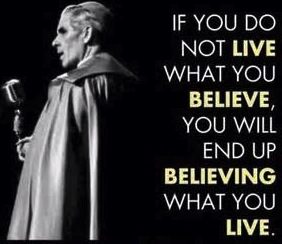
This is the fifth in a series of short reflections on the eight general attributes of God that can known by reason, as set forth by St. Thomas Aquinas in his Summa Theologica. I've been learning about St. Thomas and the Summa from Dr. Taylor Marshall and the online classes he offers at the New Saint Thomas Institute. These reflections are the result of my meditations on each individual attribute during prayer. As such, they are not meant to be deep theological discussions, but simple spiritual thoughts on the majesty of our God . I pray you find them beneficial in your walk with Christ.
___________________________________________________________________________
God is present in all things, always and everywhere. He is omnipresent. This is the fifth attribute of God according to St. Thomas. God "operates in all things" and "is in every place," if, by no other reason, than His giving everything its existence. (Summa Theologica q. 8, art. 1 and 2) Thus, God declares in the Old Testament, "I fill heaven and earth." (Jeremiah 23:24) In a similar way, Jesus tells us that "where two or three are gathered in my name, there I am in the midst of them." (Matthew 18:20)
But on this side of the thin veil between heaven and earth, God is present in another way unique from any other: the Eucharist -The body, blood, soul and divinity of Christ; Christ's flesh and blood under the appearance of bread and wine. Jesus made this quite clear:
- "This is my body which is given for you." (Luke 22:19).
- "[F]or this is my blood of the covenant, which is poured out for many for the forgiveness of sins. (Matthew 26:28).
- "Truly, truly, I say to you, unless you eat the flesh of the Son of man and drink his blood, you have no life in you; . . . For my flesh is food indeed, and my blood is drink indeed." (John 6: 53 - 55)

Before he ascended into heaven, after giving the great commission to baptize and make disciples of all nations, Jesus told the eleven apostles "I am with you always, to the close of the age." (Matthew 28:20) As often as we speak of the Incarnation, it still is easy to forget sometimes Christ's humanity. It's one of the greatest gifts and miracles God gave us. Being fully human as He was, Jesus knew what it was like to see, to touch, to smell, and to taste. He knew by experience that, as humans, we perceive reality first and foremost by our physical senses.
As such, it is only logical that when Jesus said that he would be with us "always" until the end of the age, he meant more than simply a spiritual presence. And to be clear, he does reman spiritually present with us--through the Holy Spirit; through His words in Scripture; through the love we share for our neighbor. But as human beings, Jesus knew that we, and especially the apostles, needed more than that to sustain us through the trials and sufferings of this life. Indeed, we would need his physical presence to see, to touch, to smell, and to taste. We would need the Eucharist.
While He was offending and shocking the Jews with this crazy talk of His flesh and blood, Jesus told them in no uncertain terms that "[h]e who eats my flesh and drinks my blood abides in me, and I in him." (John 6:56) To abide means to "remain or stay" and "to dwell or reside." As St. Thomas explains: "In the sacrament of the Eucharist, what is outwardly signified is that Christ is united to the one who receives it, and such a one to Christ." Stated simply, by partaking of the Eucharist--His body and blood--Christ becomes omnipresent within us. And not only that, but in every Catholic church (parish) throughout the entire world, Jesus resides--is omnipresent--in the tabernacle. Anyone who wishes may stop by whenever they like to sit with Him; talk with Him; adore Him!
In his commentary on Matthew 28:20, the great Bible scholar Cornelius a Lapide summarizes this beautifully:
"[L]ikewise, Christ has willed to abide continually in the Church in the sacrament of the Holy Eucharist. For as the humanity and deity of Christ are present in glory in Heaven, and are adored visibly by the angels and saints, so are the same likewise present in the Eucharist, but hidden under the forms of bread and wine, and therefore invisible, and are there adored, and even partaken of by the faithful."
With Lent now in full swing, I encourage you to read and pray with the sixth chapter of John's Gospel. Then carve some time out of your busy day to stop by and say hi to Jesus in the tabernacle (or exposed in a monstrance for adoration) at your local parish. If you are Catholic, try to attend a weekday Mass to receive Jesus in the Eucharist. And if you are not Catholic, perhaps never realizing His real presence in the Eucharist, then what are you waiting for? Christ wants to give Himself to you--abide in you--in a way you never thought imaginable. You won't find it in any other church on earth except the Church He founded.
God love you.


